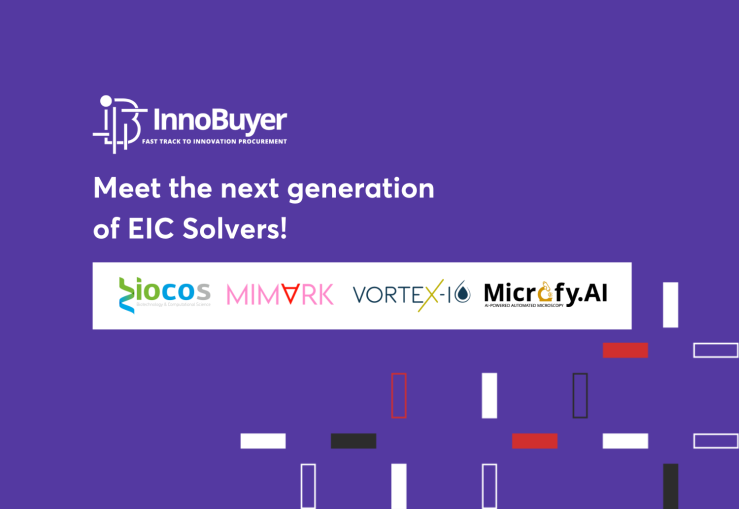Following its recent open call for EIC Solvers, InnoBuyer has selected Honey.AI, EndoPath, PurEVOO and NAIAD as the four innovative solutions set to address some of the public sector’s most pressing challenges. The solutions will be jointly developed as part of the InnoBuyer pilot programme, an initiative of the EIC Innovation Procurement Programme designed to bridge the gap between public sector needs and cutting-edge SME innovations.
Empowering collaboration: The InnoBuyer approach
The Open Call for EIC Solvers invited SMEs currently or previously funded by the European Innovation Council to propose solutions to real-world challenges alongside a public organisation of their choice. The top four consortia have now been selected to participate in a co-creation programme, receiving direct funding and expert guidance from the InnoBuyer team.
The response to this open call, with 40 applications from 13 countries, demonstrates the growing interest in collaborative innovation between the private and public sectors. InnoBuyer remains committed to fostering these partnerships, and driving forward European innovation.
Meet the Winning Consortia and Their Innovations
Honey.AI, led by Microfy Systems S.Lis an EIC SME Instrument Phase 2 beneficiary. This initiative aims to tackle honey fraud detection through AI-powered screening technology developed in collaboration with the Agri-Food Arbitration Laboratory. The project seeks to enhance food safety and integrity by leveraging artificial intelligence.
With EndoPath, the EIC Accelerator-supported company MiMARK is developing an early, objective, and cost-effective diagnostic tool for endometriosis at the primary care level. Working alongside the Institute for Research in Primary Care Jordi Gol, MiMARK's innovation aims to improve early diagnosis and patient outcomes.
PurEVOO is using DNA-based technology to ensure the integrity of extra virgin olive oil in the food industry. SME Instrument Phase 1 beneficiary BioCoS PC leads this initiative in partnership with the Bavarian Health and Food Safety Authority. Their solution seeks to combat food fraud by verifying olive oil authenticity and preventing the adulteration of high-quality products.
Finally, NAIAD is addressing sustainable water monitoring for changing riverbeds. VorteX.io, an EIC Accelerator-funded SME, is developing this solution in collaboration with Syndicat Mixte La Têt Bassin Versant. Their technology will provide critical data for environmental sustainability and water resource management.
Co-creation phase: A path to real-world impact
Over the next ten months, the selected companies will refine their solutions through pilot testing and close collaboration with their public sector partners. By the end of the programme, these innovations will be primed for broader adoption and will provide impactful solutions to pressing societal challenges.
During the piloting phase, the SMEs will interact directly with public-sector entities, gaining valuable insights into procurement processes and real-world needs. This hands-on experience will help them position their solutions for commercialization and future public tenders.
About InnoBuyer
InnoBuyer, an initiative of the EIC Innovation Procurement Programme part of the EIC Business Acceleration Services, fosters collaboration between public entities (Challengers) and EIC-backed startups and SMEs (Solvers) to address unmet needs in public services. Funded by Horizon Europe, it provides a platform for testing and validating innovative solutions in real-world settings, helping to bridge the gap between market demands and technological advancements. Through this initiative, solutions are being developed to address critical societal challenges and drive the future of innovation across different innovation sectors.
To learn more about the project and our pilot actions, follow us on social media, subscribe to our newsletter, or contact us via email.

DISCLAIMER: This information is provided in the interest of knowledge sharing and should not be interpreted as the official view of the European Commission, or any other organisation.

